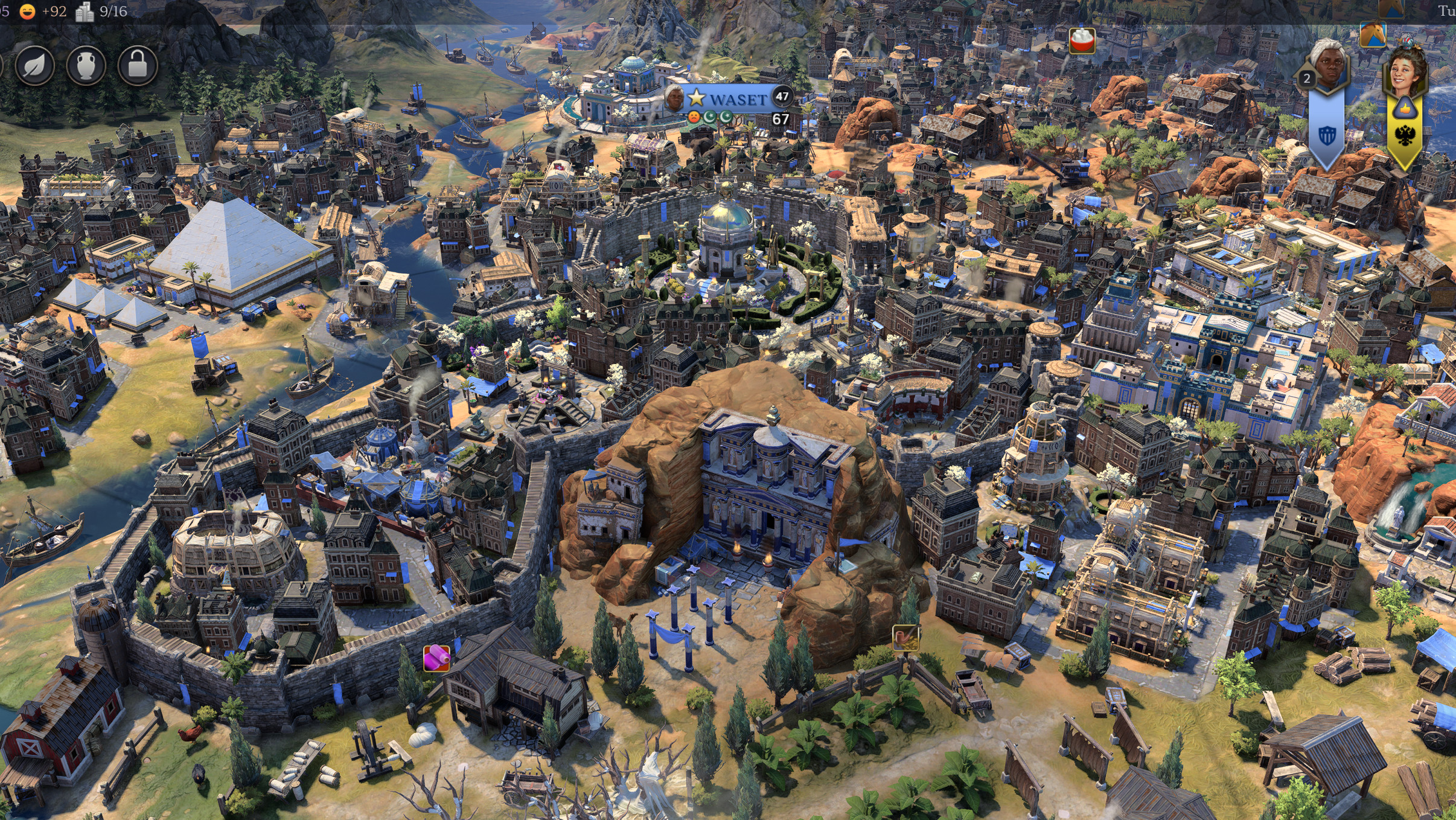
Civilization is a game that literally spans generations, with the original entry launching in 1991. I was too young to enjoy developer Sid Meier's initial go — and indeed, a couple more after that were overshadowed by my love of Age of Empires 2 and Diablo 2 — with the series really grabbing my attention around 2009 when Civilization V was announced.
I poured many hours into Civ 5, and I still consider it the best entry in the series. I know I'm not alone in that opinion. Civilization VI launched in 2016 to a generally positive reception, though for fans of the older games, it seemed like a big departure. Cartoonish graphics, a more disjointed feel for all of the new mechanics, and some serious clutter (especially nearing the end-game turns). Although I gave Civ 6 more than its fair share of playtime, Civ 5 was always the game I wanted to be playing instead.
We're 34 years past the first Civilization game, and the development company Sid Meier and associates created in 1996 — Firaxis Games — is gearing up to launch Civilization VII (Civ 7) on February 11, 2025. I was treated to a beta build of the game to see what it's all about, and I'm here with a (limited) look at the next big 4X strategy game.
My first 20 hours in Civilization VII
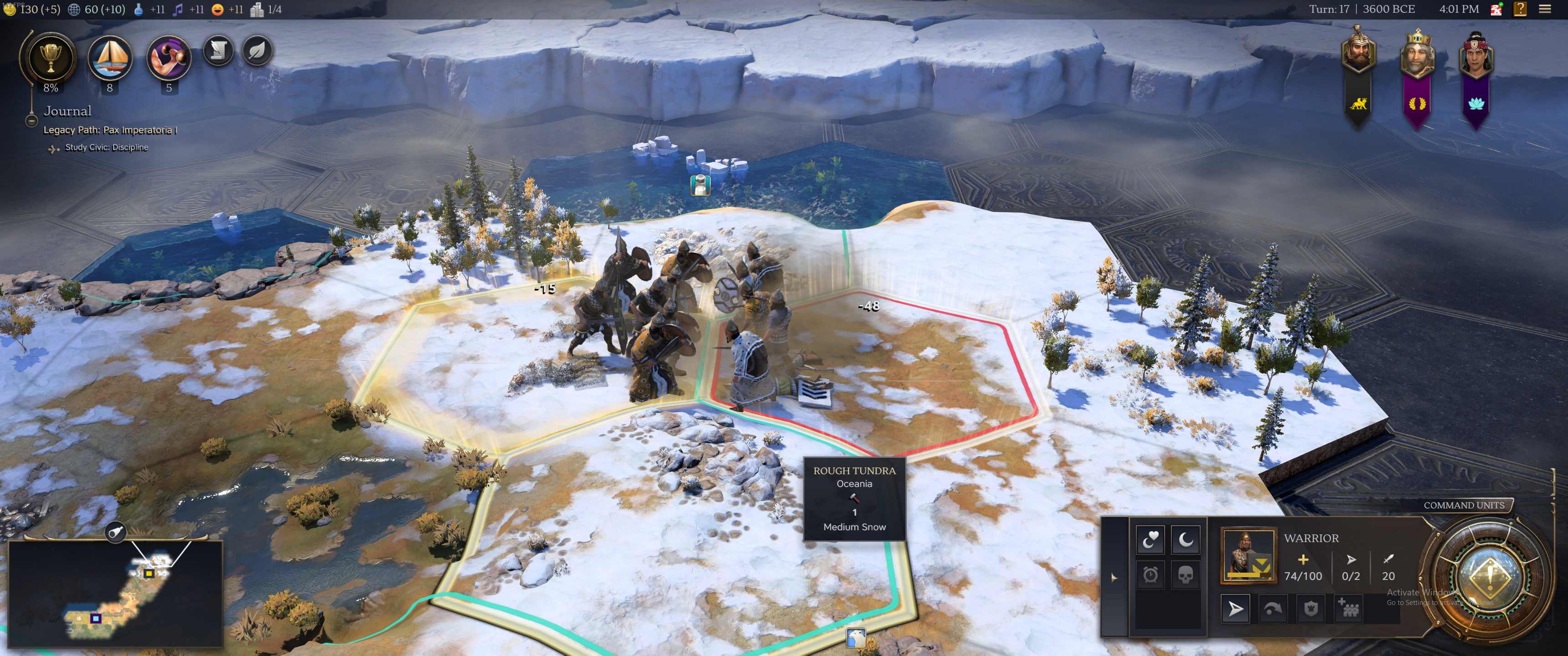
I played the preview build of Civilization VII for about 20 hours for this inside look. There are certain aspects that I'm not allowed to mention, so do note that I'll be focusing on Antiquity and Exploration ages with certain leaders and civs; my review closer to the game's official launch will have a full look at the game.
It's also worth noting that I wasn't expecting to put in quite as much time here, but as any veterans of the series know, Civilization is notorious for making you take one more turn. With more than 150 hours in Civ 5 and only about 20 in Civ 6, it's clear which game made a bigger impression than its direct predecessor.
So ... is Civilization VII good? If you're looking for a TL;DR quote, it's this: Civilization VII solves a lot of the issues that Civilization VI introduced, and it's a blast to play. As I'm writing this, I'm thinking in the back of my head about how I'm going to wrap up my longest playthrough, with Harriet Tubman leading a resilient people defending the shores of their home continent. But more on that in a moment.
Civilization VII solves a lot of the issues that Civilization VI introduced, and it's a blast to play.
I like to enter previews like this, pretending that I'm new to the series (if applicable) or that I haven't read anything about the game.
Civilization VII is an easy game to pick up and play, even if you don't have prior knowledge of how it all works. You start with a founder untethered to the land, and it's up to you to choose a starting tile for your capital city. The game generally puts you in a good spot to start, and as soon as you put down roots, the game opens up.
The game's map is divided into hexagonal tiles, on which you can expand your cities, exploit resources, position military troops, discover natural wonders, create trade routes, and much more. A turn-based approach means you can take your time making decisions.
With tutorials enabled, the game keeps you from spiraling out of control. Game mechanics are explained clearly for the most part, but there sure are a lot of pop-up windows to click through. It's unavoidable. The game is deep, but you can learn at your own pace.
If you're new to the series, I recommend creating a new game with pushover AI opponents just to learn the surface mechanics. Don't worry about getting the hang of everything at once; even I am still unsure of some of the deeper tools that show up as you progress your Civilization. The game keeps your turn rolling with automatic prompts to choose new technologies, move troops, and continue production of buildings or units. It's hard to get lost, even as a greenhorn.
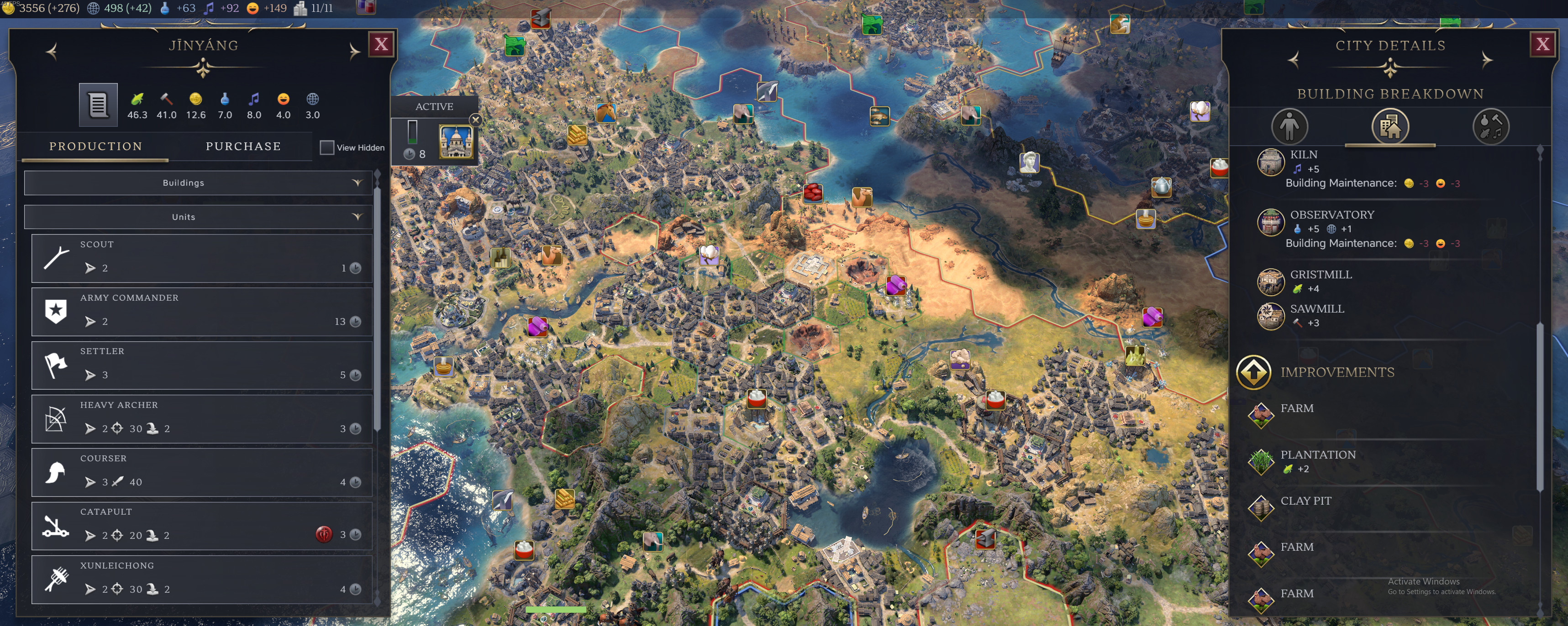
At the same time, Civilization VII feels no less deep and intricate than its predecessors. Sure, you can stomp easy opponents without really getting into the deeper tools that guide your people. Playing at a higher difficulty, however, makes it clear that you need to intelligently use all of the tools at your disposal.
One of the new mechanics has to do with diplomacy. Influence is now a resource gained through actions and specific buildings you add to your cities and towns. Influence is used to, well, influence independent nations and iconic leaders who share the map.
I chose Harriet Tubman as my leader in one game, mostly for the bonuses she receives to Influence. I started the game on one continent alongside two other civilizations; somewhere across the ocean were two unmet foes. When they landed on our shores, I urged my continental allies to join me in driving away the colonists. We set up trade routes and made research pacts. We hosted joint festivals and markets. Our armies fought together in nearby hexagons, fending off the invaders.
In the meantime, I mercilessly spied on the affairs of my allies, stealing technology and military secrets while influencing internal actions. I became suzerain of several independent states, where my Influence points came in handy, demanding raised armies and economic growth. I ate up as many tiles as possible, and I felt invincible.
Civilization VII games are split into three distinct parts
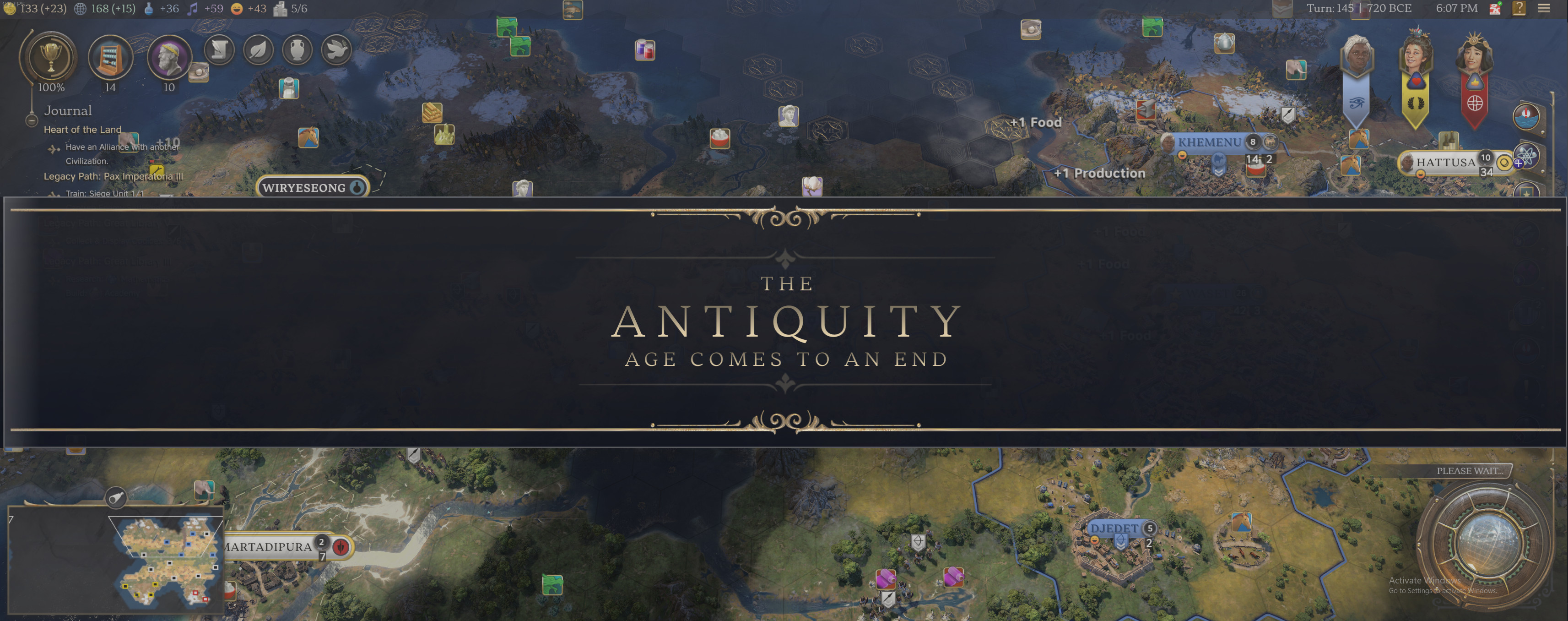
Here's where the next major change to the game comes in. Rather than having a continuous roll of time go by — in previous games, you could nuke antiquated armies if you got far enough ahead — the game is separated into three distinct ages: Antiquity, Exploration, and Modern. When the age timer fills, you move on to the next period of the game.
Although your leader doesn't change from age to age, your civilization does. And you get to choose where it goes. Leaders are no longer exclusive to certain civilizations. You start the Antiquity age playing as one civ, enter the Exploration age as a different civ, and finish up the game with a modern civilization that's still around today.
Each civilization has its own set of perks and bonuses, and I can foresee some interesting combinations that make good use of the in-game mechanics at your disposal. I was slightly concerned at the limited number of civilizations to choose from, but more are unlocked as you play through the game and hit certain achievements.
Civilization VII presents "natural" paths for your people to take. For example, playing as Confucius, I started with the Han people. Upon entering the Exploration age, I became the Ming people. I'm not allowed to comment on the next age, but you can see where the civilization is headed.
History is not kind to empires, and that's reflected in Civilization VII's new mechanics.
Turning back to my Harriet Tubman playthrough, the invincibility I felt as I approached the end of the first age was shattered by another of the game's redesigned mechanics.
As you approach the end of an age, your people are beset by a crisis. It seems like it's a random draw for what crisis you get, but your reaction is anything but. You're given several options for how to deal with the problem, and they generally add to the depth of the situation while giving a small perk. For example, my cities became infected with a plague in one playthrough, and I barely made it through due mostly to what I assume was my lack of science buildings. No smart people? No cure.
While dealing with the crisis, I must have angered my allies with my frivolous use of Influence points. I steered my people into the Exploration age successfully despite this, but it didn't take long for my former allies to denounce me and declare war. With colonizers attempting to steal more land and my former allies now staging troops around my borders, it quickly became clear that the comfort I'd enjoyed previously had now come to an end. History is not kind to empires, and that's reflected in Civilization VII's new mechanics.
Towns, Legacies, and Attributes
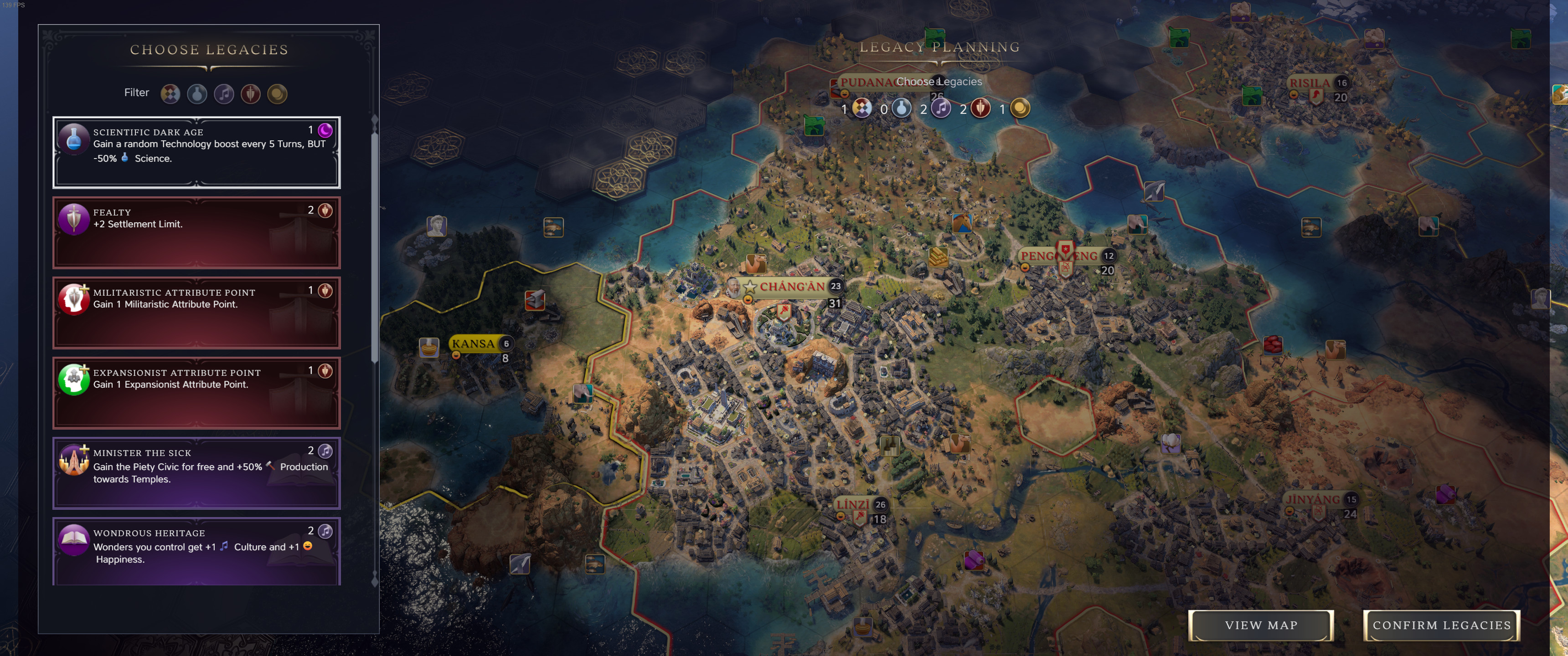
When you enter a new age, the map is given a soft reset. Only your capital city remains a city, while all of your other cities created in the previous age are bumped down to Town status. Independent states are also all fresh, waiting to be annihilated or befriended.
Towns are also new to Civ 7. They're created by your settlers, and once established they rely on gold purchases rather than production power to create buildings and units. You can upgrade towns to cities by spending a large lump sum of gold.
Upon entering a new age, you're given a number of options on where you spend Legacy points. These points are largely gained in the previous age by completing missions given by your advisors. The more you can achieve in one age, the better set up you are for the next.
How you choose to guide your civilization through the ages also depends on your leader's attribute tree. As you progress, you receive points for actions based on Cultural, Diplomatic, Economic, Expansionist, Military, and Scientific categories. These can come at any time, and you can spend them as soon as they're gained.
This opens up some interesting playstyles. Say you've been getting pounded by an enemy for the majority of an age. You know that they're lacking in culture and commerce, so you take a route for the next age that benefits your civ while harming the other. At the same time, you can bolster your civilization's focus with leader attribute points. It all seems to work well together, although the sheer amount of menus and skill trees does take some getting used to.
Reducing clutter without harming military and economic conquest
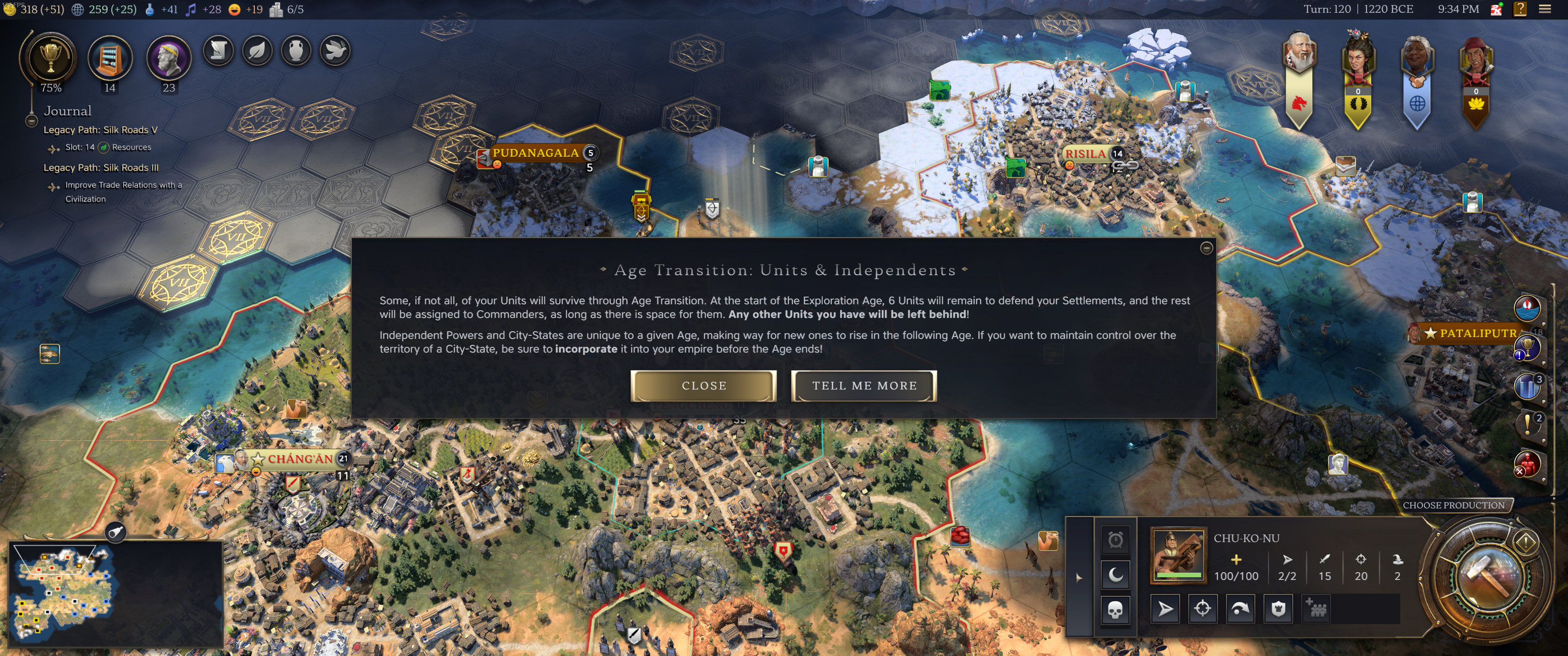
My Harriet Tubman playthrough eventually devolved into a mess of military action in the Exploration Age. I'd angered my allies with my covert overzealousness, and there was no way to avoid major war on my doorstep. So be it.
If you've played past Civilization games, you know how messy the map gets even without huge armies on the march. Because each unit needs a command (you can put units on alert to only wake when an enemy approaches), past games would have you scrolling through countless units just to reach the end of your turn.
The new Army and Naval Commander units in Civilization VII largely solve this issue. I haven't yet waged open-sea warfare, but the two types of commanders work the same way. They have open "slots" that can be populated by other military units, grouping up to seven units onto one tile that requires just one action on its turn. Commanders also have an area of influence that boosts nearby troops.
Firaxis did a great job with Commanders. They're expensive to create, but they're powerful enough to significantly change the tide of a battle. You want to keep them alive at all costs. Furthering their importance is a tech tree that's unlocked as the commander gains experience through military conquest. Need to quell a revolt in a distant settlement? Better level up a commander and choose perks that benefit the situation. Need some extra firepower on the front lines? Upgrade the commander's area of influence to benefit defensive or offensive actions.
Firaxis did a great job with Commanders. They're expensive to create, but they're powerful enough to significantly change the tide of a battle. You want to keep them alive at all costs.
Furthering the mission to reduce clutter, city expansion is now much more streamlined. When a city grows in population, you can choose to expand its borders with new tiles or double up on existing tiles with Specialists (who further add to the tile's resource generation). You don't need to move individual units to new tiles and set up shop; it's all done with, at most, just a couple of clicks.
There's also a new Overbuilding mechanic that helps deal with city sprawl. A new age often comes with a new path for your civilization to take, and specific buildings you created in the past are no longer so useful. You can choose to build over them, keeping your city core built up with buildings that benefit you most. Civilization VII places a strong emphasis on city planning, and plopping down buildings without consideration will result in less prosperity and power.
Civilization VII from a technical standpoint
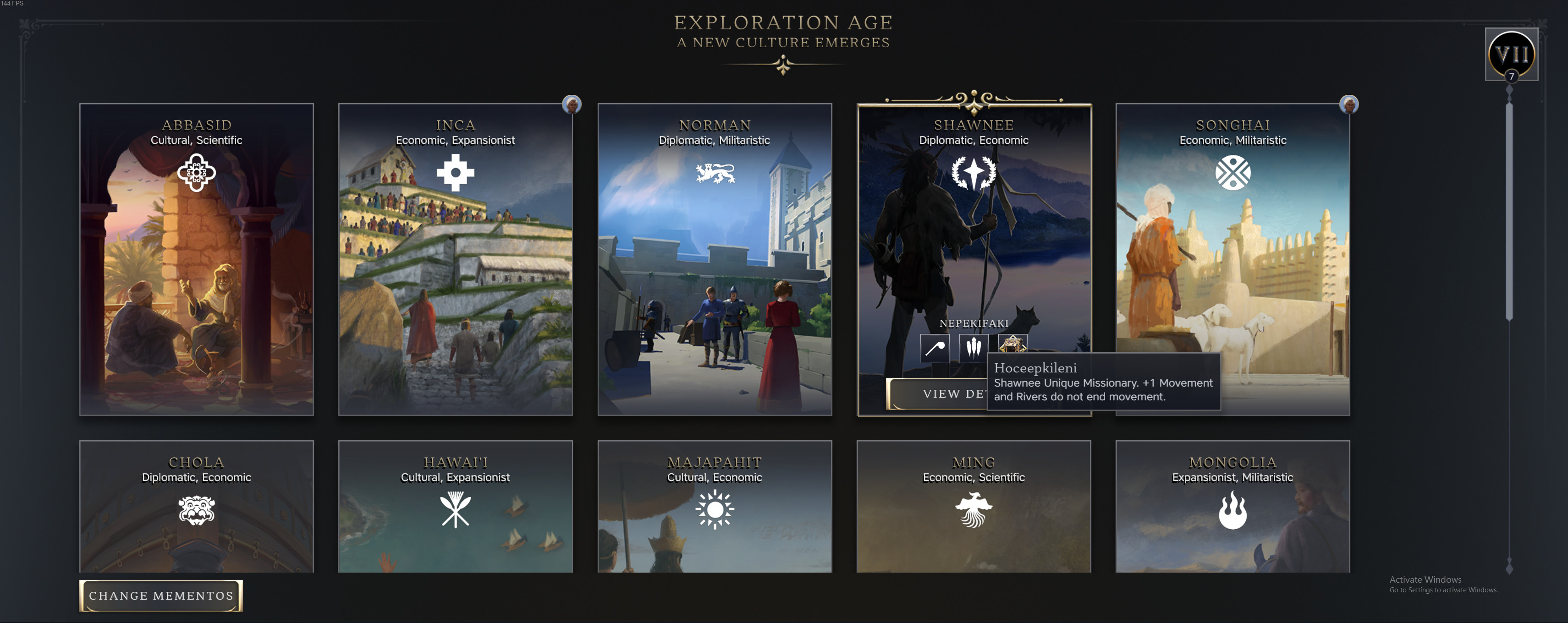
I tested a beta branch of Civilization VII on my gaming PC with an AMD Ryzen 7 9800X3D CPU, AMD Radeon RX 6800 GPU, and 32GB of DDR5 RAM. Considering the game is launching on last-gen consoles, you shouldn't be too worried about the game running smoothly on a modern PC.
I had no major performance issues even in this beta build, and a single crash in 20 hours was likely caused by an outdated driver rather than the game itself. In-game graphics and gameplay settings aren't particularly expansive, but I'll reserve judgment for a release build of the game.
As for the actual look of the game, the cartoonish graphics of Civilization VI — often equated to mobile game graphics — have been dialed back. It's still not as clean and mature as Civ 5, but it's a definite step in the right direction. Wonders you build in your civilization remain prominently displayed, your urban tiles match the age they're in, and there's a real feel that the city is alive.
Voiceover work in Civ games peaked with Sean Bean in Civ 6 — "A horse, a horse! My kingdom for a horse!" — but Gwendoline Christie does a decent job in the sequel. They're not quite as animated or energetic as Bean, but the voiceover work matches the overall stripped-back aesthetic of the menus, panels, and skill trees.
Civilization VII gives a positive first impression
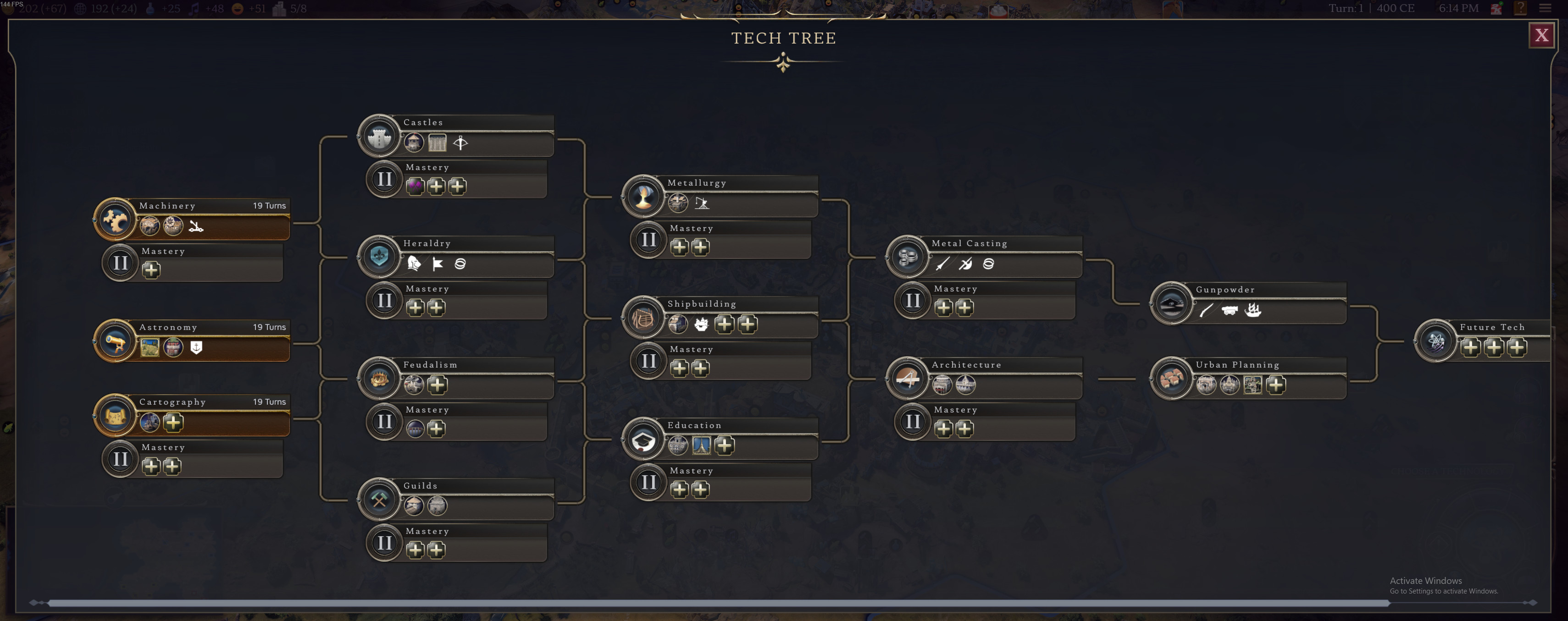
Overall, I'm having an absolute blast playing Civilization VII. I've mostly kept myself out of the final age to hopefully not spill the beans on mechanics I'm not allowed to share yet, but after this preview, I plan on taking several leaders through to the end of a game.
While Civilization VI failed to capture my attention in a meaningful way, Firaxis seems to have created a new entry that lives up to Civilization V while introducing new mechanics that are anything but frivolous and unnecessary.
New freedom to pair unique leaders with different civilizations is bound to open up some interesting strategies and playstyles. Commanders make it a lot easier to wage full-scale war without clogging up the map. And the redesigned age mechanics are a lot better than I was expecting while also making your civilization feel more rooted in its past.
Firaxis clearly knew it had to make some notable changes to the series following Civilization VI's lukewarm reception, and I can't wait to see what Civilization VII's endgame has in store.
FAQ
Is Civilization VII Steam Deck Verified?
Yes, Civilization VII (Civ 7) received Steam Deck verification ahead of the game's official launch. Although the preview beta version of the game I'm playing hasn't yet added support, an upcoming update should allow me to jump in and see how well it plays on the gaming handheld.
When does Civilization VII launch?
Civilization VII (Civ 7) is expected to launch on February 11, 2025 for PC, Xbox Series X|S, Xbox One, PS5, PS4, and Nintendo Switch.
Is Civilization VII coming to Game Pass?
There are so far no signs that Civilization VII will be available on Xbox Game Pass.
You can pre-order the game now on PC via CDKeys, where you'll save up to 28% off the regular price on a Steam key. In the same vein, the Xbox version can also be pre-ordered from CDKeys for up to 20% off the regular price.
Civilization VII is also available to buy directly from the Microsoft Store for your Xbox consoles.
What are the Civilization VII recommended PC specs?
Going off of the game's Steam page, Civilization VII developer Firaxis Games recommends you have at least an Intel Core i5-10400/AMD Ryzen 5 3600X CPU, NVIDIA RTX 2060/AMD RX 6600/Intel Arc A750 GPU, and 16GB of RAM. The game takes up about 20GB of space.
As for minimum PC requirements, you'll want at least an Intel Core i5-4690/i3-10100/AMD Ryzen 3 1200 CPU, NVIDIA GTX 1050/AMD RX 460/Intel Arc A380 GPU, and 8GB of RAM.
How many different retail versions are there for Civilization VII?
There are three separate retail versions arriving for the Civilization VII launch.
The Standard Edition includes the base game and if you pre-order, a Tecumseh leader and Shawnee civilization content pack.
The Deluxe Edition includes the base game, Tecumseh and Shawnee whether you pre-order or not, and early access to the game on February 6, 2025. It also includes two Leader Personas, a Deluxe Cosmetics pack, and a DLC pack scheduled to launch in March 2025.
The Founders Edition includes all of the Deluxe Edition content, plus two additional Leader Personas, a Founders Cosmetic pack, and another DLC pack scheduled for September 2025.







